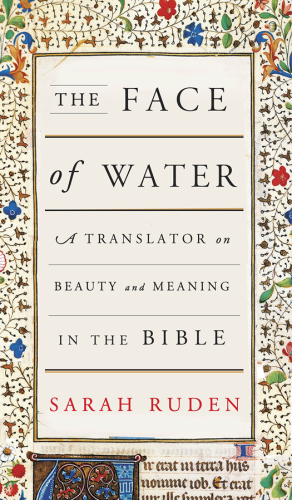
The Face of Water
A Translator on Beauty and Meaning in the Bible
کتاب های مرتبط
- اطلاعات
- نقد و بررسی
- دیدگاه کاربران
نقد و بررسی

Starred review from January 9, 2017
Ruden, visiting scholar at Brown University and translator of classical literature, shifts from secular works to the Hebrew and Greek language of the Bible for a close analysis and retranslation of a few key passages, such as the story of David and Bathsheba, the Beatitudes, and the Lord’s Prayer. Ruden’s work emphasizes the complexity inherent in translation; she lingers on some of the most challenging concepts and explicates the historical and linguistic context for her work, debunking both myths and poor prior interpretations. The book is not only a scholarly analysis, though, but a paean to the rhythm and poetry of the text. Rudin also diverges from standard academic tone, weaving her own personal stories together with her intellectual task; all this makes the reader feel as if they are spending time with a fun—and very smart—friend. This combination of casual ease and serious scholarship allows Ruden to bring fresh insights into even the most familiar stories and will make the book a true pleasure for anyone with an interest in translation or the Bible.

February 1, 2017
A poet and translator of classical literature tackles the Good Book to find concealed biblical meaning and nuance.There are peculiarities, Ruden (Paul Among the People: The Apostle Reinterpreted and Reimagined in His Own Time, 2010, etc.) discovered, with the King's English versions of the Old and New Testaments, even if that King is James. Of course, other translations of Scripture have faults, too, but when one seeks to understand what they meant when they first entered the canon, King James is the standard for comparison. The author digs into the original classic Hebrew for the Old Testament and "common dialect" Koine Greek for the New. She compares the rhetorical conventions, grammar, style, and poetics of the Hebrew and Greek to the King James. As paired case studies in translation, she presents, among other passages, the story of David and Bathsheba and the Lord's Prayer, the accounts of Genesis and the Virgin Birth, the Ten Commandments and the parable of the Good Samaritan, and the book of Jonah and Paul's comments on circumcision. Ruden retranslates these passages primarily for accuracy. "Don't close this book," she writes, "and turn on a PBS documentary about ferrets: what I'm about to tell you is way more interesting." She follows that with a grammar lesson on indicative and subjunctive moods in Hebrew verb forms. Terms for figures of speech abound, and appended at length are translations with transliterations of Hebrew and Greek with their linguistic peculiarities intact; it will surely be unhelpful to acolytes, while experts will ignore the linguistic detours. Ruden finds hidden meaning in the intricate arrangement of the ancient vocabularies, poetics, and lifestyles, and therein lies the fun. The book is often a master class in translation and Bible studies, though casual readers will decide if her "giant crowd" is more felicitous than "great multitude." No version of the Bible is the last word, as this text for grammarians, seminarians, and savants demonstrates--simultaneously didactic and entertaining, academic and easygoing.
COPYRIGHT(2017) Kirkus Reviews, ALL RIGHTS RESERVED.

January 1, 2017
Translator, scholar, and poet Ruden (Paul Among the People) here takes readers on a thoughtful journey into the depths of the Bible in its original Hebrew and Greek. Her purpose was to "read in the original languages some of the best-known passages of the Bible and describe what I saw and heard there." The need for this work grew out of the author's sense of how much is lost in most English translations, not only aesthetically but also in meaning. This book is her attempt to convey some of what is, quite literally, lost in translation. Ruden explores topics such as grammar, vocabulary, style, and comedy in more than a dozen passages, including Psalm 23, the Lord's Prayer, and Ezekiel's Vision of Dry Bones. After examining the various aspects of language, each passage is gorgeously retranslated by the author, in an effort to recapture some of its lost beauty and significance. VERDICT While overly detailed for some general readers and not quite scholarly enough for most academics, this delightful book will be a beloved treasure for select readers with an interest in deepening their appreciation of the Bible and the challenges that come with translating it faithfully and authentically.--Brian Sullivan, Alfred Univ. Lib., NY
Copyright 2017 Library Journal, LLC Used with permission.

























دیدگاه کاربران